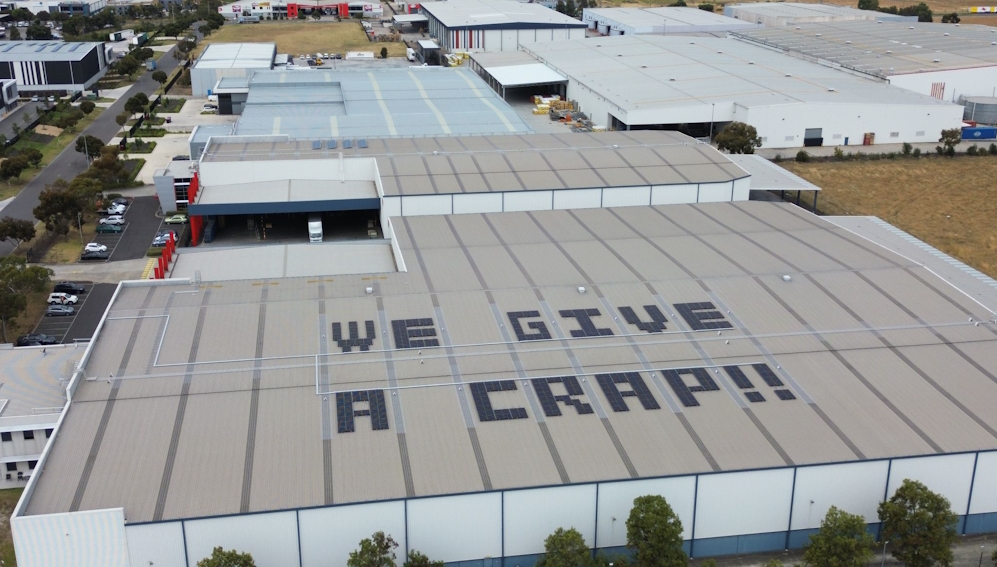Aussie brand convinces one of the biggest landlords in Australia to install solar panels spelling the word “CRAP”

Who Gives A Crap, the eco-friendly TP company, has today unveiled the world’s crappiest solar panels on its warehouse roof. The B Corp has been on a mission to do the most good — for bums, people and the planet - since day dot. Installing solar panels onto the roof of its local warehouse represents a milestone for the company as it scales its sustainability initiatives and reduces its scope 3 emissions — and also sets a precedent for other businesses on their sustainability journey.
Across the globe, the impacts of supply chains account for more than 80% of greenhouse gas emissions. This sector therefore plays a critical role in paving the way when it comes to carbon footprint reduction, and Who Gives A Crap is determined to lead by example.
Over two years and seemingly endless paperwork in the making, Who Gives A Crap worked with its warehouse partner, MCM, the building landlord and property manager for the approval and installation of its solar panels.
Due to a type of financing utilised by MCM, the project had no upfront costs for either party and by implementing solar into its supply chain, Who Gives A Crap will avoid producing 112 tonnes of carbon emissions each year. Meanwhile, the solar panels will provide all of the power required by Who Gives A Crap over the course of a year.
“We want to bust the myth that businesses can’t implement solar on their leased warehouses or buildings — we’ve proven that they can (and can even have some fun with it, like we have). We’re proud of the precedent our solar milestone sets for our community and we want to share our learnings to help other businesses make the transition,” says Elissa Foster, Head of Sustainability at Who Gives A Crap.
Australia is one of the sunniest countries in the world, and the continent has the highest solar radiation per square metre across the world. Most businesses rent their warehouses, so the challenge therefore lies in convincing commercial landlords of the value in installing solar — which is exactly why Who Gives A Crap is sharing its case study and learnings along the way for other businesses on the journey to clean energy.
“We are delighted to celebrate the outstanding success of our solar project in collaboration with our strategic partner, Who Gives A Crap. By harnessing solar energy, we have not only reduced our carbon footprint but also generated significant economic opportunities, showcasing the tremendous potential of clean energy for a thriving economy. We look forward to continued investment in sustainable practices, inclusive but not limited to solar, in our business,” says Dan McConaghy, Executive Chairman at MCM Logistics.
For example, the Solar for Business Program supports Victorian small businesses by reducing the upfront cost of installing an approved solar system up to 30kW. Its rebate covers up to 50% of the cost of a rooftop solar system. Businesses with a turnover of up to $500 million are entitled to immediately deduct the full cost of eligible depreciable assets, like a solar panel system, under the Commonwealth Instant Asset Write-Off scheme.
“We recognise there isn't one solution that will reduce all of our emissions. This initiative is just one of our emissions reduction activities. We are planning to expand solar to all of our Australian warehouses within the next 12 months and have just launched the first ever electric vehicle toilet paper fleet. We’re also looking into end of life battery solutions to tie it all together,” adds Foster.
By implementing solar, Who Gives A Crap has experienced electricity cost savings of around 24% in the first month alone. Who Gives A Crap is committed to helping the corporate community move to solar energy, and is using its blog as a resource and toolkit to help other businesses in the transition and speed up the process.
“Most emissions are produced by the corporate sector — so if every single company can reduce their emissions, then we can finally get to a point where we start to significantly reduce our impacts on climate change. Ultimately, it doesn’t matter how profitable your business is in the long run if we don’t have a world that’s worth living in. That means we all have a duty to rethink the relationship between profit and environmental impact, but in this instance we’ve been able to reduce costs and improve environmental impact - it’s absolutely win-win.” concludes Simon Griffiths, CEO and co-founder of Who Gives A Crap.







